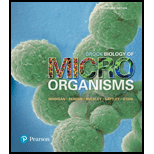
Brock Biology of Microorganisms (15th Edition)
15th Edition
ISBN: 9780134261928
Author: Michael T. Madigan, Kelly S. Bender, Daniel H. Buckley, W. Matthew Sattley, David A. Stahl
Publisher: PEARSON
expand_more
expand_more
format_list_bulleted
Question
Chapter 25.6, Problem 1CR
Summary Introduction
The kind of toxin that leads to botulism is referred as botulinum toxin secreted by the bacterium Clostridium botulinum. Similarly, the toxin responsible for tetanus is referred as tetanus toxin called as tetanopasmin is secreted by Clostridium tetani. Pathogenicity of both the diseases has a fatal effect on the neurology of the person. They work by inhibiting the function of neurotransmitters that are responsible for managing different muscular activities of an individual.
Expert Solution & Answer
Want to see the full answer?
Check out a sample textbook solution
Students have asked these similar questions
Which evidence-based stress management techniques are most effective in reducing chronic stress and supporting college students’ academic success?
students in a science class investiged the conditions under which corn seeds would germinate most successfully. BAsed on the results which of these factors appears most important for successful corn seed germination.
I want to write the given physician orders in the kardex form
Chapter 25 Solutions
Brock Biology of Microorganisms (15th Edition)
Ch. 25.1 - What event is required but not sufficient to cause...Ch. 25.1 - Prob. 2MQCh. 25.1 - Prob. 1CRCh. 25.2 - Prob. 1MQCh. 25.2 - Prob. 2MQCh. 25.2 - Prob. 3MQCh. 25.2 - Prob. 1CRCh. 25.3 - What are virulence factors? How can the LD50 test...Ch. 25.3 - Prob. 2MQCh. 25.3 - Prob. 1CR
Ch. 25.4 - Prob. 1MQCh. 25.4 - Prob. 2MQCh. 25.4 - Prob. 3MQCh. 25.4 - Prob. 1CRCh. 25.5 - Prob. 1MQCh. 25.5 - Prob. 2MQCh. 25.5 - Prob. 3MQCh. 25.5 - Prob. 1CRCh. 25.6 - What key features are shared by all AB exotoxins?Ch. 25.6 - Prob. 2MQCh. 25.6 - Prob. 3MQCh. 25.6 - Prob. 1CRCh. 25.7 - Prob. 1MQCh. 25.7 - Prob. 2MQCh. 25.7 - QDistinguish between the mechanism of cytotoxins...Ch. 25.8 - What part of the Escherichia coli cell contains...Ch. 25.8 - Why is it necessary to test for endotoxin in water...Ch. 25.8 - Prob. 1CRCh. 25 - Coagulase is a virulence factor for Staphylococcus...Ch. 25 - Although mutants incapable of producing exotoxins...
Knowledge Booster
Learn more about
Need a deep-dive on the concept behind this application? Look no further. Learn more about this topic, biology and related others by exploring similar questions and additional content below.Similar questions
- Amino Acid Coclow TABle 3' Gly Phe Leu (G) (F) (L) 3- Val (V) Arg (R) Ser (S) Ala (A) Lys (K) CAG G Glu Asp (E) (D) Ser (S) CCCAGUCAGUCAGUCAG 0204 C U A G C Asn (N) G 4 A AGU C GU (5) AC C UGA A G5 C CUGACUGACUGACUGAC Thr (T) Met (M) lle £€ (1) U 4 G Tyr Σε (Y) U Cys (C) C A G Trp (W) 3' U C A Leu בוט His Pro (P) ££ (H) Gin (Q) Arg 흐름 (R) (L) Start Stop 8. Transcription and Translation Practice: (Video 10-1 and 10-2) A. Below is the sense strand of a DNA gene. Using the sense strand, create the antisense DNA strand and label the 5' and 3' ends. B. Use the antisense strand that you create in part A as a template to create the mRNA transcript of the gene and label the 5' and 3' ends. C. Translate the mRNA you produced in part B into the polypeptide sequence making sure to follow all the rules of translation. 5'-AGCATGACTAATAGTTGTTGAGCTGTC-3' (sense strand) 4arrow_forwardWhat is the structure and function of Eukaryotic cells, including their organelles? How are Eukaryotic cells different than Prokaryotic cells, in terms of evolution which form of the cell might have came first? How do Eukaryotic cells become malignant (cancerous)?arrow_forwardWhat are the roles of DNA and proteins inside of the cell? What are the building blocks or molecular components of the DNA and proteins? How are proteins produced within the cell? What connection is there between DNA, proteins, and the cell cycle? What is the relationship between DNA, proteins, and Cancer?arrow_forward
- please fill in the empty sports, thank you!arrow_forwardIn one paragraph show how atoms and they're structure are related to the structure of dna and proteins. Talk about what atoms are. what they're made of, why chemical bonding is important to DNA?arrow_forwardWhat are the structure and properties of atoms and chemical bonds (especially how they relate to DNA and proteins).arrow_forward
- The Sentinel Cell: Nature’s Answer to Cancer?arrow_forwardMolecular Biology Question You are working to characterize a novel protein in mice. Analysis shows that high levels of the primary transcript that codes for this protein are found in tissue from the brain, muscle, liver, and pancreas. However, an antibody that recognizes the C-terminal portion of the protein indicates that the protein is present in brain, muscle, and liver, but not in the pancreas. What is the most likely explanation for this result?arrow_forwardMolecular Biology Explain/discuss how “slow stop” and “quick/fast stop” mutants wereused to identify different protein involved in DNA replication in E. coli.arrow_forward
arrow_back_ios
SEE MORE QUESTIONS
arrow_forward_ios
Recommended textbooks for you
 Medical Terminology for Health Professions, Spira...Health & NutritionISBN:9781305634350Author:Ann Ehrlich, Carol L. Schroeder, Laura Ehrlich, Katrina A. SchroederPublisher:Cengage Learning
Medical Terminology for Health Professions, Spira...Health & NutritionISBN:9781305634350Author:Ann Ehrlich, Carol L. Schroeder, Laura Ehrlich, Katrina A. SchroederPublisher:Cengage Learning- Understanding Health Insurance: A Guide to Billin...Health & NutritionISBN:9781337679480Author:GREENPublisher:CengageEssentials of Pharmacology for Health ProfessionsNursingISBN:9781305441620Author:WOODROWPublisher:Cengage



Medical Terminology for Health Professions, Spira...
Health & Nutrition
ISBN:9781305634350
Author:Ann Ehrlich, Carol L. Schroeder, Laura Ehrlich, Katrina A. Schroeder
Publisher:Cengage Learning

Understanding Health Insurance: A Guide to Billin...
Health & Nutrition
ISBN:9781337679480
Author:GREEN
Publisher:Cengage


Essentials of Pharmacology for Health Professions
Nursing
ISBN:9781305441620
Author:WOODROW
Publisher:Cengage
Nervous System - Get to know our nervous system a bit closer, how does it works? | Neurology; Author: FreeMedEducation;https://www.youtube.com/watch?v=6O-0CVAgaEM;License: Standard youtube license